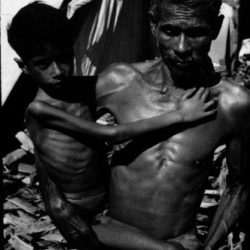
War, Child Marriage & Poor Health: The Dangerous Consequences of Food Insecurity

There are so many things we tend to take for granted living in an affluent Western society. One of the most obvious is probably sustenance. We assume we will have easy access to food and rarely think about how the food got to our table and what we would do if the food marketplace suddenly became out of our reach.
In truth people across the globe suffer from malnourishment and hunger. It should be seen an unforgivable injustice that so many people starve when we have such a surplus of food.
The dangers of malnourishment and hunger go beyond just empty bellies. It’s important to look at the negative consequences of food shortages and food insecurity.
First off is the relationship between food insecurity and conflict or war. This may be the most unfair of the damaging effects.
Conflict and war stands as the leading cause of food insecurity, with 74 million people suffering because of our combative nature.
Even more depressingly, these two evils have an almost parasitic relationship, with conflict feeding the creation of food insecurity and food insecurity causing wars. This is what has been labeled the conflict trap.
It’s fair to say that people trapped in this environment are in an incredibly unfair situation and need a solution.
There are groups seeking to help and the World Food Programme is a good example. Working with partners, WFP seeks to minimize the damage being done to these populations by offering food or funding to purchase food in exchange for recipients doing work to improve their communities.
This is a great way to reduce food insecurity and revive communities destroyed by civil strife like Sudan and the Congo.
Truth be told these two problems are ones that desperately need solutions but likely won’t be eradicated as long as the other is still present.
I believe in humanity though, and I think we have it in us to stop fighting and feed the world. We need to in order to ensure our survival.
Real hunger can be an overpowering experience that can cloud our best judgement and make us do things we wouldn’t think of doing otherwise.
This is clearly seen in parts of the world where young girls are essentially sold in exchange for food, traded to much older men to lessen the burden on their families. In fact, according to Human Rights Watch, girls from the poorest quarter of families are twice as likely to marry before 18 compared to those from the richest quarter.
Take Yemen for example. The country is in the middle of an extended conflict and, as a result, is seeing a dangerous rise in child marriage. Two-thirds of the Yemen female population are now married before they turn 18 and 44% are married before they turn 15.
These early marriages are devastating for these girls. Child brides lose their chance to be educated and face risks that come from giving birth before their bodies and minds are ready. They are also at a higher risk of experiencing domestic violence and sexual abuse.
The extent of this injustice is immense and we need to do everything we can to eliminate it.
This is what Girls Not Brides is aiming to do. A partnership of civil society organizations from across the globe the initiative’s purpose is to raise awareness of child marriage and its evils and work to end the practice worldwide.
Want to help? The initiative has partnered with Women’s WorldWide Web, a crowdfunding platform, in order to make it easier to donate. This is how your money can really make a positive impact.
Of course the dangers stemming from food insecurity extend past sexual violence and violence. Across the globe people are suffering from health issues and chronic disease that are exasperated by their limited access to food.
Studies have shown the link between food insecurity and the corresponding rise in health problems. A study done by Feeding America, for example, found that people experiencing food insecurity face higher rates of diet-related diseases.
This makes a lot of sense when you consider how much your diet can affect your body and its ability to fight unwanted diseases or viruses.
Food insecurity also has a major impact on mental health. According to PROOF, food insecure adults account for 1/3 of mental health hospitalizations in Canada.
What does this mean? Rising food insecurity means a rise in chronic conditions, which means increased health care need and increased health care costs. This should be of concern to anyone who uses a health care system and wants it to run smoothly.
Addressing the causes of food insecurity would in turn reduce the strain on health care systems, making them run more efficiently and reducing costs. Obviously this is an issue everyone should want to see addressed.
Food insecurity is an insidious problem that is only going to grow as climate change and overpopulation continue. This, obviously, is not good news.
Beyond just the horrific experience that is life without food the effects are causing more turmoil and pain to people across the globe.
We produce more than enough food to ensure no one should go hungry and we know we need to do everything in our power to reduce war, child marriage and preventable diseases.
So many people in this world are hungry and this should make all of us hungry for justice. Let’s make sure no belly goes unfed.

